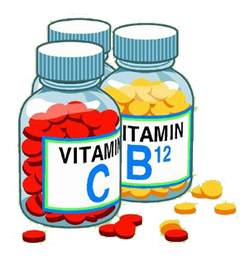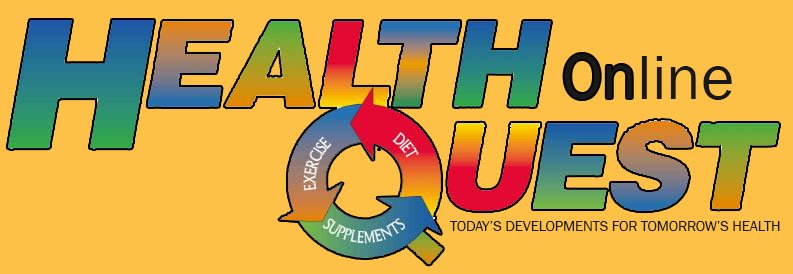List of Vitamins
A comprehensive Vitamins List
Vitamins are organic materials that cannot be synthesized by your body in adequate quantities. They must be obtained from your diet.

Basically they are chemicals that your body needs to survive but can't produce on its own. So you have to get them from things you eat.
Up until the 1900's the only source of vitamins was from food. But research allowed scientists to identify and extract the different vitamins and provide them as supplements to a diet.
Vitamin supplements have grown in popularity. The rise of processed food along with pollution, pesticides, genetically modifying food and increased amounts of time in storage and shipping has reduced the nutritional quality of food.
Stress, poor nutrition, illness and certain prescription drugs also make it difficult for some people to absorb the vitamins they are getting in their diet.
Vitamin supplements can ensure your body has the necessary amounts of the vitamins found on the list of vitamins.
Because vitamins are a chemical many scientists believed that a synthetic version of each vitamin could be man made. The government agreed with them and allowed companies to produce and sell synthetic vitamins.

Synthetics are cheaper to produce and therefore cheaper for the consumer. However, synthetic vitamins do not contain the total complex family of micro-nutrients found with the vitamin in its natural form.
A vitamin obtained in its natural state and not created in the lab is the best form for your body.
Your body was not created to use man made chemicals, it needs vitamins in the natural form.
There are 13 vitamins that are currently recognized.
Vitamin List
|
Vitamin Name |
Functions in Body |
Natural Food Sources |
|
Betacarotene |
Good Antioxidant. Helps with vision and skin health. Boosts immune function and bone metabolism |
Carrots, yellow and orange fruits, fish, eggs |
|
Thiamine |
Important for nerve function and the cardiovascular system. Helps with energy production. |
Whole grains, pork, eggs, brown rice, potatoes |
|
Riboflavin |
Important for energy production and helps metabolize fats and carbs. |
Grains, leafy green vegetables, fish, dairy, legumes |
|
Niacin |
Helps release energy from carbs and promotes healthy skin |
Grains, nuts, broccoli, carrots, dairy, peanuts, tomatoes, dairy, eggs, meat |
|
Pantothenic Acid |
Helps metabolize fats, carbs and proteins. Needed for synthesis or various enzymes. |
meats, whole grains, fish, legumes |
|
Pyridoxine |
Helps to release sugars needed for energy. Helps in metabolism and in generation of red blood cells. Also beneficial to the nervous system. |
whole grains, fish, poultry, bananas |
|
Biotin |
Needed for cell growth. Helps with energy production. Helps maintain blood sugar levels. |
legumes, nuts |
|
Folic Acid |
Important in DNA production and repair. Necessary in red blood cell production. Critical during growth spurts especially for fetus and infants. |
beans, cereals, leafy vegetables, dairy, pork, rice, oranges |
|
Important for brain and nerve function as well as DNA regulation. Also participates in metabolism and red blood cell formation. |
ham, certain seafood, dairy, liver | |
|
Ascorbic Acid |
Important anti-oxidant. Helps heal wounds and supports the immune system. It is a natural antihistamine. |
citrus fruits, strawberries, broccoli, greens |
|
Boosts immune function. Benefits bone formation and reduces risk of osteoporosis. |
exposure to suns rays, salmon, sardines, cod liver oil | |
|
Tocopherol |
Another important antioxidant that helps protect the bodies cells from free radicals. |
whole grains, wheat germ, nuts, spinach |
|
Essential for blood clotting. |
green leafy vegetables, broccoli, cauliflower |
All vitamins found on the list of vitamins can be found in common everyday food. A healthy diet that contains a variety of fresh, organic food can provide you with the vitamins you need.
However, environmental factors such as pesticides, pollution, and stress along with the processing of food can reduce the amount of vitamins stored in food.
Today more than ever it is becoming more important to supplement your diet with a natural vitamin supplement that has not killed the vitamin during the production process.
Educating yourself about the vitamins on the list is only the first step.
It's something to think about!
Almost weekly we see the results of new studies proving the benefits of vitamins and minerals.
The Nutrients required for health are much higher than can reasonably be obtained from foods alone.
For example, To get 100 IU of vitamin E from food, a person would have to consume seven cups of peanuts, two cups of corn oil or 19 cups of spinach in a day.
I don't see that happening in my day, how about yours?
Looking for more information about Health and Nutrition. Feel free to visit our monthly online Newsletter -
Health Quest
You will find current, relevant information along with solutions including healthy products. The information is always free and we will never pressure you into buying products but please know that I do make a small commission from any of the sales. I use these products myself.
If you would like a reminder each month with a quick synopsis of what you will find in the newsletter please enter your email below.





